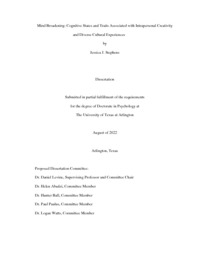
ATTENTION: The works hosted here are being migrated to a new repository that will consolidate resources, improve discoverability, and better show UTA's research impact on the global community. We will update authors as the migration progresses. Please see MavMatrix for more information.
Show simple item record
| dc.contributor.advisor | Levine, Daniel | |
| dc.creator | Stephens, Jessica J. | |
| dc.date.accessioned | 2022-09-15T13:59:31Z | |
| dc.date.available | 2022-09-15T13:59:31Z | |
| dc.date.created | 2022-08 | |
| dc.date.issued | 2022-08-12 | |
| dc.date.submitted | August 2022 | |
| dc.identifier.uri | http://hdl.handle.net/10106/30976 | |
| dc.description.abstract | An experience with a different culture (cross-cultural experience; CCE) can provide opportunities to think about new and unfamiliar concepts and to solve problems using cross-cultural knowledge and inspired thinking. This could be because a CCE disrupts rigid thinking and compels open, unique, and integrative thinking. To test this, three experiments were executed. Each tested the influence of a temporary mindset of deculturation, which describes thoughts related to suppressing one’s dominant culture while adapting to a new culture, on generative forms of creative thinking. Two of these experiments also evaluated the influence of the temporary mindset, acculturation, which describes thoughts of combining elements of distinct cultures while adapting to new cultures, on generative and convergent forms of creative thinking. The final experiment additionally assessed the influence of a joint mindset of deculturation (cultural suppression) and acculturation (cultural fusion) on generative and convergent forms of creative thinking. Furthermore, this research examined traits of cognitive flexibility, or adept mental task-switching and conceptualizing, integrative complexity, or mental diversification and recombinative thinking, cultural adaptability, or aptitude to experience diverse cultures, and cultural identification, or a developed sense of intrapersonal cultural identity. These experiments consistently determined that deculturation mindsets relate to enhanced creative performance, typically for numerous measures of divergent thinking. This project also determined that certain cultural identification strategies, namely marginalization, integration, and assimilation, and forms of cultural adaptability consistently relate to various creative performance outcomes. In contrast to previous research, integrative complexity and cognitive flexibility were not found to significantly associate with most creativity measures. | |
| dc.format.mimetype | application/pdf | |
| dc.language.iso | en_US | |
| dc.subject | Creativity | |
| dc.subject | Acculturation | |
| dc.subject | Deculturation | |
| dc.subject | Diversity | |
| dc.subject | Multiculturalism | |
| dc.subject | Culture | |
| dc.title | Mind Broadening: Cognitive States and Traits Associated with Intrapersonal Creativity and Diverse Cultural Experiences | |
| dc.type | Thesis | |
| dc.degree.department | Civil Engineering | |
| dc.degree.name | Doctor of Philosophy in Psychology | |
| dc.date.updated | 2022-09-15T13:59:31Z | |
| thesis.degree.department | Psychology | |
| thesis.degree.grantor | The University of Texas at Arlington | |
| thesis.degree.level | Doctoral | |
| thesis.degree.name | Doctor of Philosophy in Psychology | |
| dc.type.material | text | |
| dc.creator.orcid | 0000-0003-1345-6405 | |
Files in this item
- Name:
- STEPHENS-DISSERTATION-2022.pdf
- Size:
- 1.269Mb
- Format:
- PDF
This item appears in the following Collection(s)
Show simple item record


